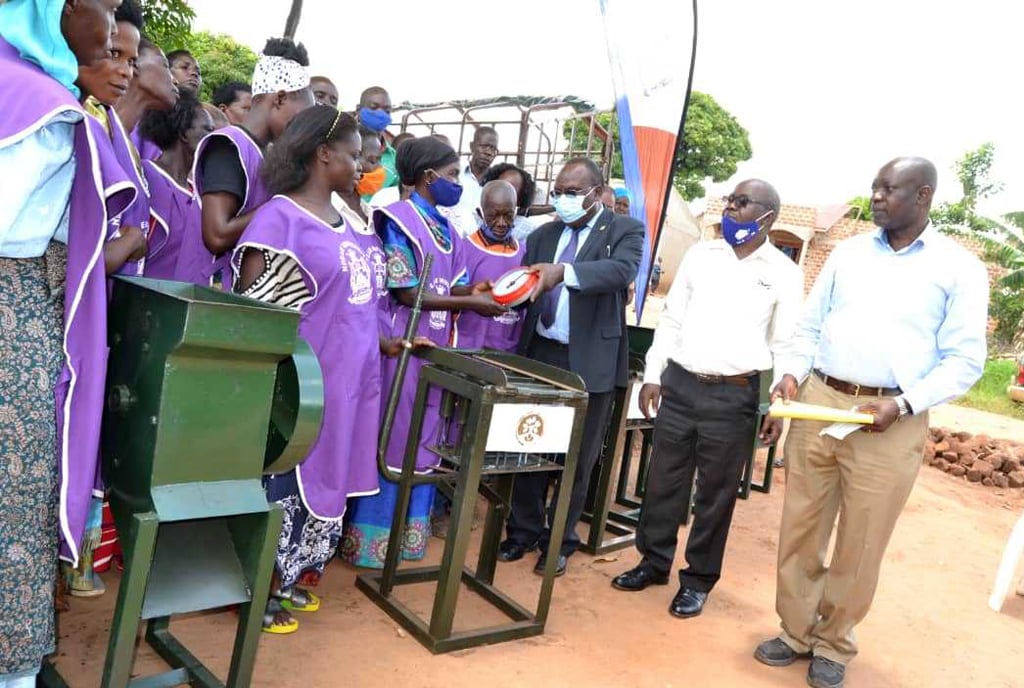Nakaseke model villages get boost in briquette making technology

Residents of Mijinje village in Nakaseke District receive the briquettes pressing machines from Ndejje University officials on April 11, 2021. Photo/ Dan wandera
Nakaseke model villages get boost in briquette making technology
DAN WANDERA
Ms Justine Naiga, a mother of four is a proud member Kokogwanga development group actively engaged in the briquette making project as source of income as part of the group campaign to sensitize more residents on the alternative energy resource from garbage waste in Nakaseke District.
Naiga now believes that the acquisition of the briquette making machines targeting a bigger number of residents that are already engaged in the briquette making industry is a big step for the recently rolled out campaign to boost the use of the renewable energy resources for both income generation and environment protection.
“We are beneficiaries of a community outreach project rolled out by Ndejje University to help communities in protecting the environment through adaptation of the alternative natural renewable energy sources. We did not know that the home and garden waste could be turned into briquettes as an alternative source to boost our respective incomes as we protect the environment,” Naiga reveals in an interview.
She is part of the Nakaseke model villages that on Sunday received the briquette making machines extended by Ndejje University under the Energy Research and Development Centre helping communities turn the home and garden waste into briquettes for income generation.
For Mr Stephen Mbowa, a member of Nakawungu development group and resident of Nakawungu village in Semuto Sub county, briquette making is a fast spreading activity for the village residents that have had the opportunity to get the training.
“Our problem has been the lack of machines to ensure that our briquette project enters the commercial production chain to boost incomes. We already have orders but had been crippled by the lack of the machines. We could only make a few briquettes that could not meet the market demands. We had been linked to the potential markets but could not meet the demand,” Mr Mbowa explains.
“While we target communities for the different outreach programs as part of the University core values of impacting on the communities, the need to help rediscover their core mandate of protecting the environment is very paramount. The residents of Nakaseke District among other areas should be brought on board as partners in educating the masses about the alternative energy sources that are environment friendly.”
“We are targeting the creation of model villages that can help disseminate the good news about the potential benefits of the renewable energy resources. This alternative energy is from the waste from homes and gardens. The waste has always been a burden to families but now generates income inform of briquettes used as an alternative source of energy,” Ndejje University Vice Chancellor, Prof Eriab Lugujjo explains.
The University has partners including the Christian Services International that is rolling out a grant to boost the renewable energy resources generation and use. We have been able to purchase the machines to ensure that the selected communities in Nakaseke become village models for the renewable energy resource. The technology used is very simple and this possibly explains why the residents are now more interested in the briquette production project. The University will continue training more residents help them rediscover the potential in recycling the waste as an alternative energy source, Prof Lugujjo reveals.
The University is already buying from the residents some of the excess waste that has been processed into dust for bigger briquette production capacity. But because they now posses the machines the residents will now make better briquettes in bigger quantities. We are helping the community to generate income from the waste generated from the homes and gardens. Many could not believe that the waste could at one time become useful. This is one way of reducing poverty in communities that have now found fortune in the excess waste products that can be recycled through burning to make the briquettes, Ms Prossy Namulindwa a coordinator and lecturer at the Energy Research and Development Center explains.





